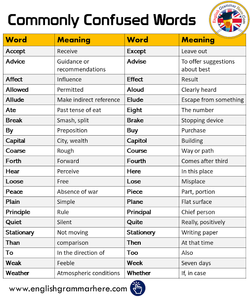Jun 14, 2022
CONFUSING ENGLISH WORD PAIRS
Words that sound alike or nearly alike but have different meanings often cause writers trouble. Here are a few of the most common pairs with correct definitions and examples:
ACCEPT-to receive
ex: He accepts defeat well.
EXCEPT-to take or leave out
ex: Please take all the books off the shelf except for the red one.
AFFECT-to influence
ex: Lack of sleep affects the quality of your work.
EFFECT-n., result, v., to accomplish
ex: The subtle effect of the lighting made the room look ominous.
ex: Can the university effect such a change without disrupting classes?
ALLUSION-an indirect reference
ex:The professor made an allusion to Virginia Woolf's work.
ILLUSION-a false perception of reality
ex: They saw a mirage: that is a type of illusion one sees in the desert.
ALL READY-prepared
ex: Dinner was all ready when the guests arrived.
ALREADY-by this time
ex: The turkey was already burned when the guests arrived.
ALTOGETHER-entirely
ex: Altogether, I thought that the student's presentation was well planned.
ALL TOGETHER-gathered, with everything in one place
ex: We were all together at the family reunion last spring.
APART-to be separated
ex: The chain-link fence kept the angry dogs apart. OR My old car fell apart before we reached California.
A PART-to be joined with
ex: The new course was a part of the new field of study at the university. OR A part of this plan involves getting started at dawn.
BREATH-noun, air inhaled or exhaled
ex: You could see his breath in the cold air.
BREATHE-verb, to inhale or exhale
ex: If you don't breathe, then you are dead.
CITE-to quote or document
ex: I cited ten quotes from the same author in my paper.
SIGHT-vision
ex: The sight of the American flag arouses different emotions in different parts of the world.
SITE-position or place
ex: The new office building was built on the site of a cemetery.
COMPLEMENT-noun, something that completes; verb, to complete
ex: A nice dry white wine complements a seafood entree.
COMPLIMENT-noun, praise; verb, to praise
ex: The professor complimented Betty on her proper use of a comma.
CONSCIENCE-sense of right and wrong
ex: The student's conscience kept him from cheating on the exam.
CONSCIOUS-awake
ex: I was conscious when the burglar entered the house.
COUNCIL-a group that consults or advises
ex: The men and women on the council voted in favor of an outdoor concert in their town.
COUNSEL-to advise
ex: The parole officer counseled the convict before he was released.
ELICIT-to draw or bring out
ex: The teacher elicited the correct response from the student.
ILLICIT-illegal
ex: The Columbian drug lord was arrested for his illicit activities.
ITS-of or belonging to it
ex: The baby will scream as soon as its mother walks out of the room.
IT'S-contraction for it is
ex: It's a beautiful day in the neighborhood.
LEAD-noun, a type of metal
ex: Is that pipe made of lead?
LED-verb, past tense of the verb "to lead"
ex: She led the campers on an over-night hike.
LOSE--verb, to misplace or not win
ex: Mom glared at Mikey. "If you lose that new lunchbox, don't even think of coming home!"
LOOSE--adjective, to not be tight; verb (rarely used)--to release
ex: The burglar's pants were so loose that he was sure to lose the race with the cop chasing him.
ex: While awaiting trial, he was never set loose from jail because no one would post his bail.
PASSED-verb, past tense of "to pass," to have moved
ex: The tornado passed through the city quickly, but it caused great damage.
PAST-belonging to a former time or place
ex: Who was the past president of Microsquish Computers?
PRECEDE-to come before
ex: Pre-writing precedes the rough draft of good papers.
PROCEED-to go forward
ex: He proceeded to pass back the failing grades on the exam/
QUOTE-verb, to cite
ex: I would like to quote Dickens in my next paper.
QUOTATION-noun, the act of citing
ex: The book of famous quotations inspired us all.
STATIONARY-standing still
ex: The accident was my fault because I ran into a stationary object.
STATIONERY-writing paper
ex: My mother bought me stationery that was on recycled paper.
SUPPOSED TO-correct form for "to be obligated to" or "presumed to" NOT "suppose to"
SUPPOSE-to guess or make a conjecture
ex: Do you suppose we will get to the airport on time? When is our plane supposed to arrive? We are supposed to check our bags before we board, but I suppose we could do that at the curb and save time.
THAN-use with comparisons
ex: I would rather go out to eat than eat at the dining hall.
THEN-at that time, or next
ex: I studied for my exam for seven hours, and then I went to bed.
THROUGH-by means of; finished; into or out of
ex: He plowed right through the other team's defensive line.
THREW-past tense of throw
ex: She threw away his love letters.
THOROUGH-careful or complete
ex: John thoroughly cleaned his room; there was not even a speck of dust when he finished.
THOUGH-however; nevertheless
ex: He's really a sweetheart though he looks tough on the outside.
THRU-abbreviated slang for through; not appropriate in standard writing
ex: We're thru for the day!

By undefined
2 notes ・ 71 views
English
Intermediate